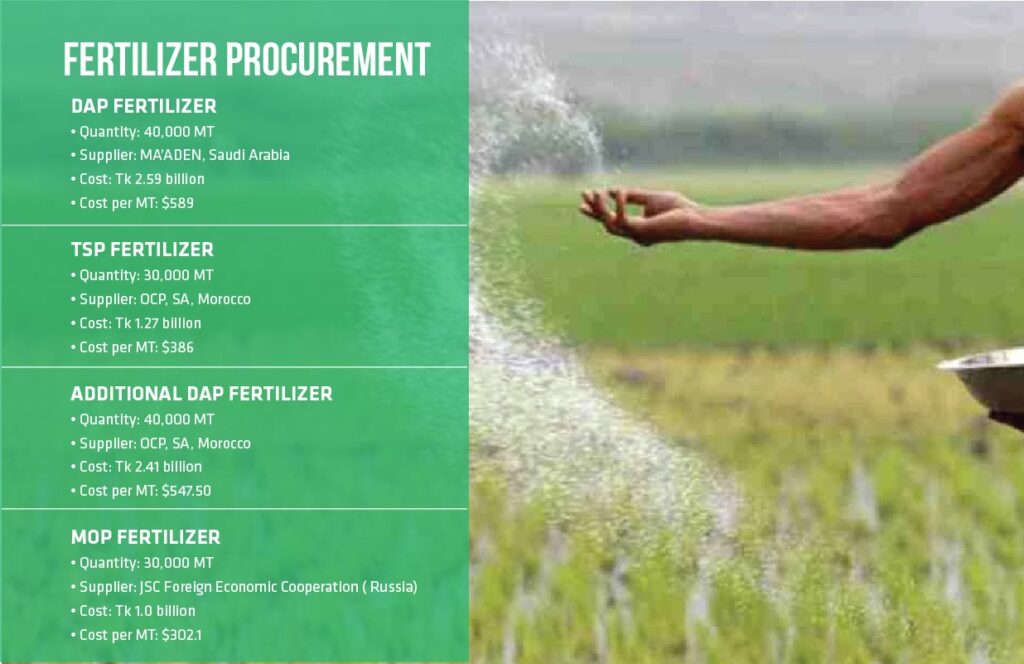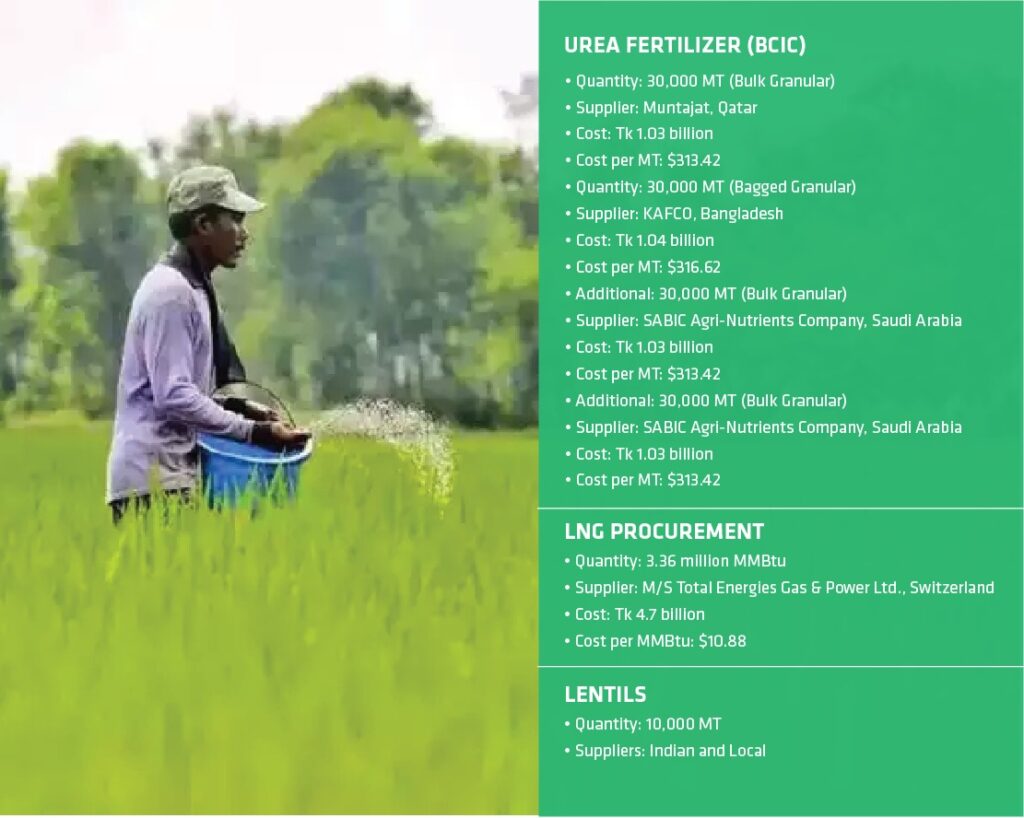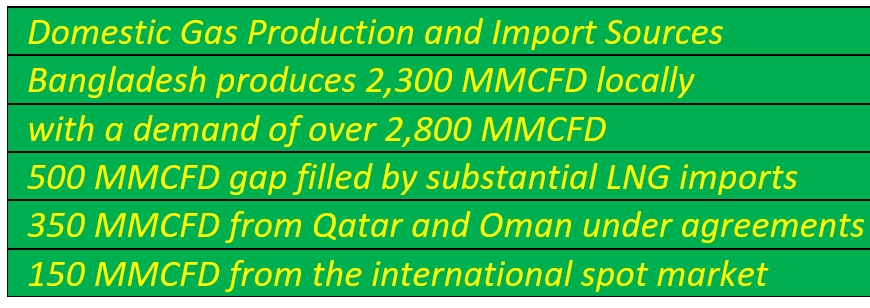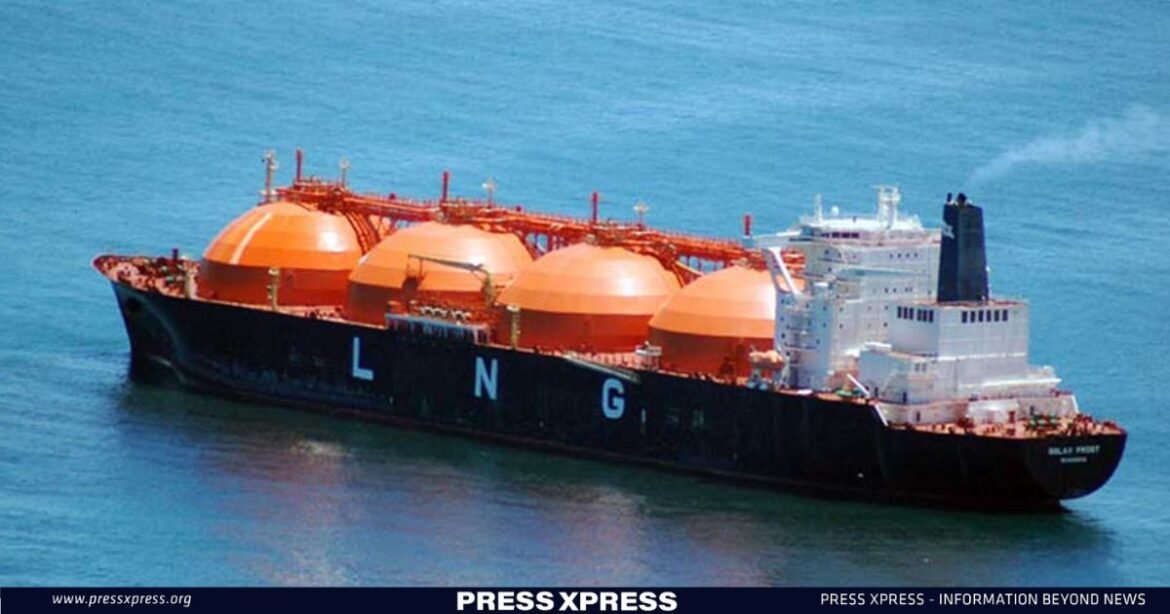In a significant move to bolster agricultural productivity and meet the rising energy needs, the government of Bangladesh has greenlit the procurement of 260 thousand metric tonnes of fertilizer and 3.36 million MMBtu (million British thermal units) of Liquified Natural Gas (LNG). The decisions were made during the meeting of the Cabinet Committee on Government Purchase (CCGP) in the current year, held on Tuesday at the Bangladesh Secretariat, with Finance Minister Abul Hassan Mahmood Ali presiding over the session.
The government of Bangladesh has recently given the green light to procure essential resources to meet the increasing demand within the country. The Cabinet Committee on Government Purchase (CCGP) held its first meeting of the year, chaired by Finance Minister Abul Hassan Mahmood Ali. The approved proposals include the procurement of 260 thousand metric tonnes of fertilizers and 3.36 million MMBtu of Liquefied Natural Gas (LNG).
Procurement Of LNG
The Energy and Mineral Resources Division proposed the procurement of 3.36 million MMBtu of LNG from M/S Total Energies Gas & Power Ltd., Switzerland. The approved cost for this procurement is approximately Tk 4.7 billion, with a per MMBtu LNG cost of $10.88.
Fertilizer Acquisition
DAP Fertilizer Procurement
Bangladesh Agricultural Development Corporation (BADC) will procure 40,000 metric tonnes of DAP (Diammonium Phosphate) fertilizer from MA’ADEN, Saudi Arabia, costing Tk 2.59 billion. The per-tonne cost of fertilizer is $589.
TSP Fertilizer Procurement
BADC will acquire 30,000 metric tonnes of TSP (Triple Super Phosphate) fertilizer from OCP, SA, Morocco. The cost for this procurement is estimated at Tk 1.27 billion, with a per-tonne cost of $386.
DAP Fertilizer Procurement
BADC will further procure 40,000 metric tonnes of DAP fertilizer from OCP, SA, Morocco, at a cost of Tk 2.41 billion. The per-tonne cost for this fertilizer is $547.50.
MOP Fertilizer Import
BADC is set to import 30,000 metric tonnes of MOP (Muriate of Potash) fertilizer from JSC Foreign Economic Cooperation (Prodintorg), Russia, costing Tk 1.0 billion. The per-tonne cost for MOP fertilizer is $302.1.

Urea Fertilizer Procurement
- Bangladesh Chemical Industries Corporation (BCIC) will procure 30,000 metric tonnes of bulk granular urea fertilizer from Muntajat, Qatar, at an estimated cost of Tk 1.03 billion, with a per-tonne cost of $313.42.
- BCIC will also acquire 30,000 metric tonnes of bagged granular urea fertilizer from KAFCO, Bangladesh, costing Tk 1.04 billion, with a per-tonne cost of $316.62.
- BCIC’s additional procurement includes 30,000 metric tonnes of bulk granular fertilizer from SABIC Agri-Nutrients Company, Saudi Arabia, at a cost of Tk 1.03 billion, with a per-tonne cost of $313.42.
- BCIC’s second consignment involves the purchase of 30,000 metric tonnes of bulk granular urea fertilizer from SABIC Agri-Nutrients Company, Saudi Arabia, at a cost of Tk 1.03 billion, with a per-tonne cost of $313.42.

Other Procurements
Apart from fertilizers and LNG, the Ministry of Commerce presented three separate proposals, leading to the Trading Corporation of Bangladesh (TCB) procuring 12 million litres of rice bran oil from various suppliers under the Direct Procurement Method (DPM). Additionally, TCB will procure 10,000 metric tonnes of lentils from Indian and local suppliers.
These strategic procurements highlight the government’s commitment to ensuring a stable supply of essential commodities in the face of growing demand, contributing to the overall economic stability of the country.
LNG in 2023
In 2023, Bangladesh resumed LNG imports after a temporary halt during the Russia-Ukraine war. The Cabinet Committee on Government Purchase (CCGP) approved Petrobangla’s proposal to import one LNG cargo at $19.78 per MMBtu, totaling Tk850 crore. The government, led by Agriculture Minister Abdur Razzaque, plans to import 12 LNG cargos to address growing natural gas demand. Following IMF advice, gas price adjustments were implemented for industries and power plants to reduce subsidies and secure loans. However, tariffs for households, fertilizer production, CNG-run vehicles, and tea gardens remained unchanged. Despite producing 2,300 MMCFD locally, Bangladesh imports LNG to bridge the 500 MMCFD gap in demand, including 350 MMCFD from Qatar and Oman under long-term agreements and 150 MMCFD from the international spot market.

Evolving Landscape of Bangladesh’s Energy Sector
Rising Demand and Challenges in Gas Exploration
In recent years, Bangladesh has witnessed significant changes in its energy sector, marked by a rising demand for natural gas. However, challenges in gas exploration and production have led to an increasing reliance on the import of liquefied natural gas (LNG). The global turbulence in LNG prices, ranging from a low of US$ 2.0 per Million British Thermal Units (MMBtu) in 2020 to an unprecedented high of US$ 56 per MMBtu in October 2021, has further complicated the energy landscape. This fluctuation, coupled with recent foreign exchange shortages, poses a potential threat to Bangladesh’s energy security.
Bridging the Gap: LNG Imports
Due to the growing depletion of natural gas reserves, Bangladesh made the strategic decision to import LNG in 2017. The current total gas demand stands at 3715 Million Standard Cubic Feet per Day (MMscfd), and projections by PetroBangla estimate a demand of 3,777 MMscfd in 2024-25 and 3,990 MMscfd in 2025-26. Despite efforts from national and international exploration companies, including BAPEX, BGFCL, SGFL, Chevron, and Tullow, the average gas production remains at 3008 MMscfd, creating a significant gap between supply and demand.
LNG Imports: A Double-Edged Sword
Bangladesh began importing LNG in 2018-19, and it has played a crucial role in meeting the country’s gas demand. In 2022, the country imported 5.06 million metric tons of LNG from Qatar Gas, Oman Trading, and the Spot market, amounting to USD 4,555 million. The volume of imports has doubled since 2018-2019, raising concerns about the risks and vulnerabilities associated with heavy reliance on LNG.
Potential Risks
- High Price Volatility: The volatile nature of LNG prices globally poses challenges for consumers, utilities, and firms, impacting power cuts, industrial production, and food supply due to foreign exchange reserve shortages.
- Financial Sustainability: Growing reliance on LNG jeopardizes the financial sustainability of the power system, leading to operating losses for the Bangladesh Power Development Board and necessitating substantial government subsidies.
- Climate Change Impact: Despite being a cleaner fuel, LNG contributes to climate change due to its methane content, exacerbating Bangladesh’s vulnerability to natural disasters.
- Health and Productivity Concerns: The expansion of fossil fuels and LNG may lead to increased heat stress, impacting respiratory health and mental well-being, affecting overall productivity.
Path Forward: A Call for Policy Changes
- Given the risks associated with heavy reliance on LNG imports, the government of Bangladesh should consider strategic policy changes.
- Prioritize renewable energy sources to reduce dependence on fossil fuels, allocating budgetary resources for their development.
- Focus on enhancing domestic gas exploration and production to bridge the supply-demand gap and reduce vulnerability to global LNG market conditions.
- Provide incentives for solar-based power generation, addressing import duties on necessary accessories to encourage a shift towards sustainable energy sources.
- Allocate a separate budget for the conversion from diesel-run to solar-based irrigation systems, promoting uninterrupted and carbon-free energy supply.
In conclusion, a comprehensive and sustainable energy strategy is essential for Bangladesh to navigate the challenges posed by the evolving landscape of the energy sector and ensure a secure, affordable, and environmentally friendly energy future.


